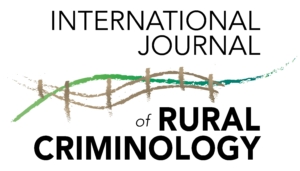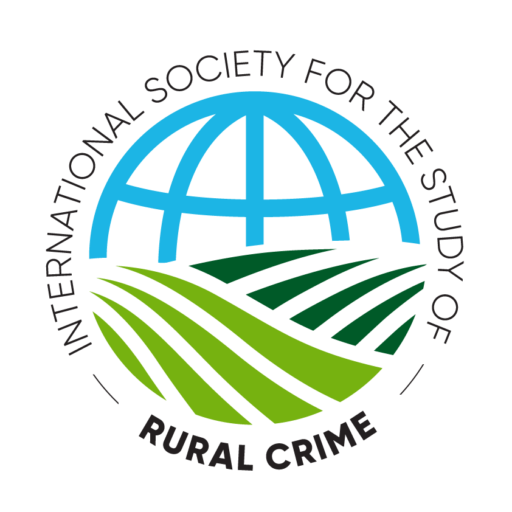ISSRC Blog
This blog provides an opportunity for pithy observations or reflections on topical rural crime news and developments, a summary of research, promotion of publications, advertisements for upcoming events… and more! If you would like to contribute, email a submission of no more than 500 words to admin@issrc.net
‘Rural Policing in North America’ roundtable
Rural crime and criminal justice practices and responses face different challenges from those experienced in urban contexts. Our new series of ISSRC Roundtables investigate challenges in international contexts and provide opportunities for participants to promote their research and practice and build collaborations for future initiatives. Follow on Twitter @RuCrimSociety with #ISSRC2021
Rural crime and criminal justice practices and responses face different challenges from those experienced in urban contexts.
On 15 September 2021, ISSRC proudly hosted a practitioner-focused roundtable which considered community policing and crime-reduction efforts on issues surrounding rural policing. The roundtable provided an opportunity for participants to hear first-hand from four leaders in rural policing about work being done in the US and Canada to police rural crime.
Missed the Roundtable – don’t dispair! You can watch it on our YouTube channel.
We asked our panellists three key things:
- What is the key element to successful community policing in your community?
- What is one initiative in which you have successfully engaged the community in crime-reduction efforts?
- What is the most significant challenge to successfully reducing crime in your community?
Moderator and host
 The event will be hosted and moderated
The event will be hosted and moderated
from the University of Nebraska at Kearney (United States)
Featuring…
 Inspector Farica Prince
Inspector Farica Prince
Blood Tribe Police Service (Canada)
Inspector Prince joined Dakota Ojibway Police Service in 2001 and served her home community of Sioux Valley, in south west Manitoba. In 2005, Inspector Prince made the difficult decision to leave her home and joined the Blood Tribe Police Service. The Blood Tribe, aka Kainai, is the largest land-based Indigenous community in Canada. She served as an instructor/facilitator at RCMP’s national training academy in Regina Saskatchewan for three years and has been serving as the Inspector in charge of the Administrative Support Division since 2018. Inspector Prince also became a first-generation university graduate in 2019.
 Chief Rob Davis
Chief Rob Davis
Chief of Police at Brantford Police Department (Canada)
Chief Davis began his career in 1990, and has since served small rural towns and Indiginous communities throughout Canada. Prior to serving as Chief of Police, he championed the drive that led to Six Nations becoming the first Aboriginal Police Service in Canada to join the Criminal Intelligence Service of Ontario and also served as an Inspector overseeing operations throughout reserves northwest of Ontario. Chief Davis is proud to be a Mohawk from the Six Nations of the Grand River Territory and a recipient of the prestigious OACP & IPA Gimborn Scholarship for his dedication & efforts to combat gangs and organized crime.
 Chief Jim Davis
Chief Jim Davis
Director of Law Enforcement Services at the University of Nebraska Kearney (United States)
Chief Davis has 37 Years of Law Enforcement Experience ranging from Police Officer to Sheriff. His current position includes Chief of Police, Emergency Management Director, and Parking Director. Chief Davis is a guest instructor at the South Dakota Law Enforcement Training Center and an adjunct Criminal Justice instructor at UNK. He has a Master’s Degree in Criminal Justice and is scheduled to graduate with his doctorate in management in 2022. He also still enjoys working the Sturgis Motorcycle Rally.
 Mark Prosser
Mark Prosser
Retired Law Enforcement (United States)
Mr Prosser has over 40 years of Law Enforcement experience starting as a patrol officer in1979. Until his retirement in 2020, he held positions including Chief of Detectives, Supervisor for a multi-jurisdictional homicide unit, and Chief of Police in Storm Lake, Iowa. Mr Prosser was named Law Enforcement Executive of the Year for 2016 by the Iowa Police Chiefs Association. He holds a Bachelor of Science Degree in Police Administration and has completed some Graduate Studies in Public Administration and Management. Mr Prosser taught for 19 years at the Illinois Police Academy, Buena Vista University, and Iowa Central Community College. Currently, he works for the Catholic Diocese of Sioux City, Iowa as the Director of the Pastoral Planning Office and remains a voice for immigration reform at the national level.
‘Rural Policing in North America’ roundtable
Rural crime and criminal justice practices and responses face different challenges from those experienced in urban contexts.
ISSRC is proud to host a practitioner-focused roundtable which will investigate community policing and crime-reduction efforts on issues surrounding rural policing. The roundtable will provide an opportunity for participants to hear first-hand from four leaders in rural policing about work being done in the US and Canada to police rural crime.
The roundtable is free to attend. However, if you are able to make a donation, funds will be directed to the ISSRC awards program for higher degree research students, early career researchers, and practitioners.
Ample opportunity will be provided for attendees to engage with the panel.
Register via EventBrite:
For more information and link to EventBrite registration, visit www.issrc.net/roundtables/
We ask our panellists three key things:
- What is the key element to successful community policing in your community?
- What is one initiative in which you have successfully engaged the community in crime-reduction efforts?
- What is the most significant challenge to successfully reducing crime in your community?
Wednesday 15 September 2021
5.00pm – 6.30pm (CDT; US)
6.00pm – 7.30pm (EDT; Toronto, Canada)
4.00pm – 5.30pm (MDT; Calgary, Canada)
For time zones in other places, check the Time and Date website by adding your location.
Moderator and host
 The event will be hosted and moderated
The event will be hosted and moderated
from the University of Nebraska at Kearney (United States)
Featuring…
 Inspector Farica Prince
Inspector Farica Prince
Blood Tribe Police Service (Canada)
Inspector Prince joined Dakota Ojibway Police Service in 2001 and served her home community of Sioux Valley, in south west Manitoba. In 2005, Inspector Prince made the difficult decision to leave her home and joined the Blood Tribe Police Service. The Blood Tribe, aka Kainai, is the largest land-based Indigenous community in Canada. She served as an instructor/facilitator at RCMP’s national training academy in Regina Saskatchewan for three years and has been serving as the Inspector in charge of the Administrative Support Division since 2018. Inspector Prince also became a first-generation university graduate in 2019.
 Chief Rob Davis
Chief Rob Davis
Chief of Police at Brantford Police Department (Canada)
Chief Davis began his career in 1990, and has since served small rural towns and Indiginous communities throughout Canada. Prior to serving as Chief of Police, he championed the drive that led to Six Nations becoming the first Aboriginal Police Service in Canada to join the Criminal Intelligence Service of Ontario and also served as an Inspector overseeing operations throughout reserves northwest of Ontario. Chief Davis is proud to be a Mohawk from the Six Nations of the Grand River Territory and a recipient of the prestigious OACP & IPA Gimborn Scholarship for his dedication & efforts to combat gangs and organized crime.
 Chief Jim Davis
Chief Jim Davis
Director of Law Enforcement Services at the University of Nebraska Kearney (United States)
Chief Davis has 37 Years of Law Enforcement Experience ranging from Police Officer to Sheriff. His current position includes Chief of Police, Emergency Management Director, and Parking Director. Chief Davis is a guest instructor at the South Dakota Law Enforcement Training Center and an adjunct Criminal Justice instructor at UNK. He has a Master’s Degree in Criminal Justice and is scheduled to graduate with his doctorate in management in 2022. He also still enjoys working the Sturgis Motorcycle Rally.
 Mark Prosser
Mark Prosser
Retired Law Enforcement (United States)
Mr Prosser has over 40 years of Law Enforcement experience starting as a patrol officer in1979. Until his retirement in 2020, he held positions including Chief of Detectives, Supervisor for a multi-jurisdictional homicide unit, and Chief of Police in Storm Lake, Iowa. Mr Prosser was named Law Enforcement Executive of the Year for 2016 by the Iowa Police Chiefs Association. He holds a Bachelor of Science Degree in Police Administration and has completed some Graduate Studies in Public Administration and Management. Mr Prosser taught for 19 years at the Illinois Police Academy, Buena Vista University, and Iowa Central Community College. Currently, he works for the Catholic Diocese of Sioux City, Iowa as the Director of the Pastoral Planning Office and remains a voice for immigration reform at the national level.
New look International Journal of Rural Criminology!
 The International Journal of Rural Criminology (IJRC) is a double blind peer-reviewed journal dedicated to publishing empirical and theoretical work related to crime and criminal justice issues associated with diverse rural places of the world. It is fully open access.
The International Journal of Rural Criminology (IJRC) is a double blind peer-reviewed journal dedicated to publishing empirical and theoretical work related to crime and criminal justice issues associated with diverse rural places of the world. It is fully open access.
The IJRC now serves as the official organ of the International Society for the Study of Rural Crime; the American Society of Criminology’s Division of Rural Criminology; and the Rural Crime Working Group of the European Society of Criminology.
You’ll find the history of the journal here. And the focus and scope of the journal here.
IJRC provides opportunity for peer-reviewed submissions in a number of forms:
- full length articles
- research notes
- reviews
- And an exciting new addition is ‘Police and Practice: Notes from the field’ allowing for practical insights from those outside of academia
“Rural criminology” has become the established term for the growing body of multi- and cross-disciplinary scholarship, and the IJRC welcomes submissions which explore:
- theories of rurality and crime
- space and place data collection and methodologies associated with the challenges of rural research
- rural offending
- criminal justice processes, institutions and policy
- rural policing
- crime prevention
- practices that seeks solutions to rural crime and the security of rural peoples and rural communities
- and other related topics
Visit the IJRC website to find out more – and to register as a reader; author if you wish to submit at some stage; and as a reviewer if you are keen to contribute in this way.
* * *
IJRC instructions
To register: go to the Journal’s website. On the menu bar (about in the center), click on “register.” The windows with an asterisk are required (username, password, repeat password, first name, last name, email, and confirm email). Both the username and password must be in letters (alphanumeric) only and you cannot skip any spaces (important to know if you use your name).
It is appreciated if you also fill out affiliation, url (if applicable), mailing address, country, short biostatement, and working languages. Very important: when you “register as”, the default is “reader”. Please also click on “author” and “reviewer”, and a short list of topics on which you are willing to be a reviewer. Then, click register.
Go to the IJRC webpage and log in to make sure your username and password work.
To submit an article: On the right side of the User Home page, you can see your history (if any) of previous submissions as an author or as a reviewer. To the right of this summary of roles, in blue lettering, are the words “new submission.” Click on this, and then begin the five step process:
(1) start by selecting a section for your manuscript (there are four from which to select – full length article, research note, policy and practice: notes from the field, and reviews), then go through the submission checklist, followed by the copyright notice (don’t forget to click the “authors agree” box), then consider adding comments for the editor (not necessary/optional), and finally, click on save and continue;
(2) choose file and upload your submission, then click save and continue;
(3) enter or revise any of the metadata (the metadata is taken from your original registration). It is here that you can add co-authors, plus you should add in the manuscript title and abstract, followed by3-5 keywords, and if it applies, enter any contributors and supporting agencies. Then, click save and continue;
(4) the fourth step is for uploading supplementary files. There is a brief explanation of possible supplementary files. Most who submit will not have anything extra to upload, but it is an option, just in case. Click save and continue; and
(5) confirm the submission by clicking “finish submission.” At that point, the submission is complete and the web page thanks you for your interest in IJRC.
IJRC instructions for authors who are resubmitting after revisions to the first draft
Go to the IJRC webpage and log in. It shows that you are an author, and will even tell you how many you have submitted (although it will rarely be more than “1”). Click on the title of your manuscript, which will take you to the summary page. Click on review, which is in blue lettering and immediately below a number that is the designation for your manuscript. Scroll down to “editor decision”. It is there that you will choose your revised file/manuscripts and upload it back into the IJRC system.
IJRC instructions for reviewers
You can go to the IJRC webpage after receiving an invitation to review, log in, and it shows that you are a reviewer, and will even tell you how many others you are reviewing (ex. — “1 active”). If you click on reviewer, you can go the title, and it is there that you accept to be a reviewer. Then, the manuscript can be downloaded and so too, the review form (steps 1 and 2).
Once you submit your review, you can also submit a recommendation. You can do this by going to step 3 (review form) and entering your comments. You also have the option of adding a file (step 4) with additional comments (choose file and then upload). Step 5 is a recommendation. Once you make your recommendation, you then click on submit review.

